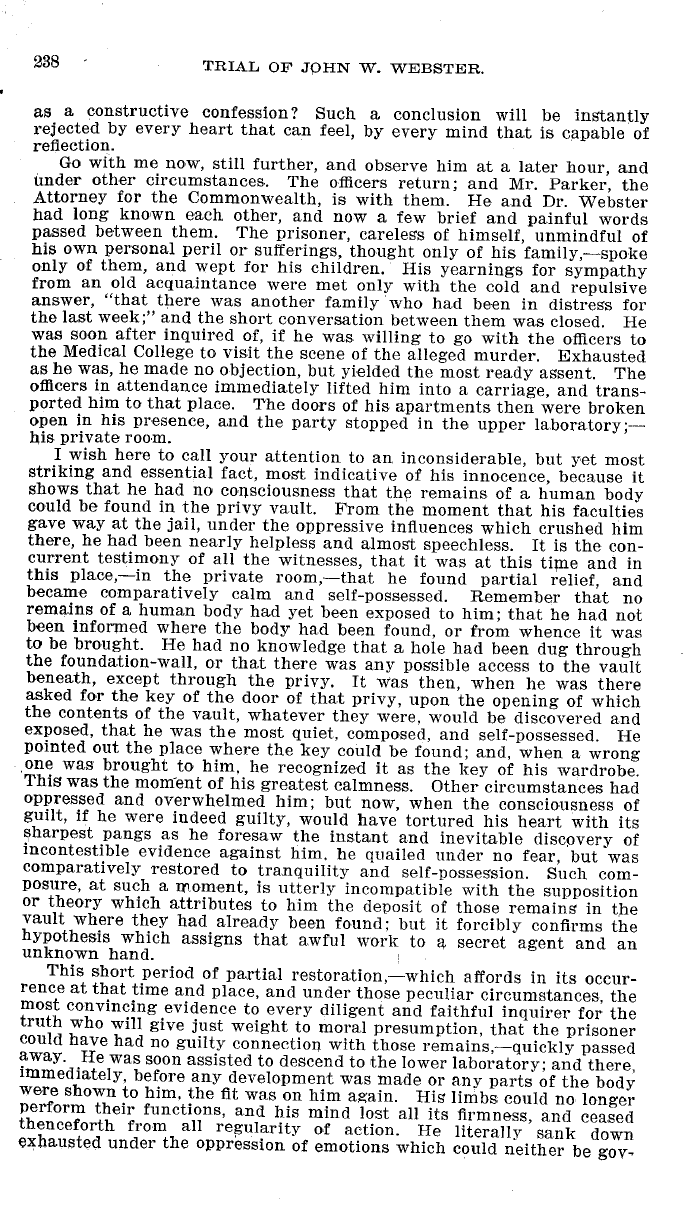|
23$ - TRIAL OF JOHN W. WEBSTER.
as a constructive confession? Such a conclusion will be instantly
rejected by every heart that can feel, by every mind that is capable of
reflection.
Go with me now, still further, and observe him at a later hour, and
under other circumstances. The officers return; and Mr. Parker, the
Attorney for the Commonwealth, is with them. He and Dr. Webster
had long known each other, and now a few brief and painful words
passed between them. The prisoner, careless of himself, unmindful of
his own personal peril or sufferings, thought only of his family,-spoke
only of them, and wept for his children. His yearnings for sympathy
from an old acquaintance were met only with the cold and repulsive
answer, "that there was another family who had been in distress for
the last week;" and the short conversation between them was closed. He
was soon after inquired of, if he was. willing to go with the officers to
the Medical College to visit the scene of the alleged murder. Exhausted.
as he was, he made no objection, but yielded the most ready assent. The
offcers in attendance immediately lifted him into a carriage, and trans-
ported him to that place. The doors of his apartments then were broken
open in his presence, and the party stopped in the upper laboratory;--
big private room.
I wish here to call your attention to an inconsiderable, but yet most
striking and essential fact, most indicative of his innocence, because it
shows that he had no consciousness that the remains of a human body
could be found in the privy vault. From the moment that his faculties
gave way at the jail, under the oppressive influences which crushed him
there, he had been nearly helpless and almost speechless. It is the con-
current testimony of all the witnesses, that it was at this time and in
this place,-in the private room,-that he found partial relief, and
became comparatively calm and self-possessed. Remember that no
remains of a human body had yet been exposed to him; that he had not
been informed where the body had been found, or from whence it was
to be brought. He had no knowledge that a hole had been dug through
the foundation-wall, or that there was any possible access to the vault
beneath, except through the privy. It was then, when he was there
asked for the key of the door of that privy, upon the opening of which
the contents of the vault, whatever they were, would be discovered and
exposed, that he was the most quiet, composed, and self-possessed. He
pointed out the place where the key could be found; and, when a wrong
one was brought to him, he recognized it as the key of his wardrobe.
This was the moment of his greatest calmness. Other circumstances had
oppressed and overwhelmed him; but now, when the consciousness of
guilt, if he were indeed guilty, would have tortured his heart with its
sharpest pangs as he foresaw the instant and inevitable discovery of
incontestible evidence against him, he quailed under no fear, but was
comparatively restored to tranquility and self-possession. Such com-
posure, at such a Moment, is utterly incompatible with the supposition
or theory which attributes to him the deposit of those remains in the
vault where they had already been found; but it forcibly confirms the
hypothesis which assigns that awful work to a secret agent and an
unknown hand.
This short period of partial restoration,-which affords in its occur-
rence at that time and place, and under those peculiar circumstances, the
most convincing evidence to every diligent and faithful inquirer for the
truth who will give just weight to moral presumption, that the prisoner
could have had no guilty connection with those remains,-quickly passed
away. He was soon assisted to descend to the lower laboratory; and there,
immediately, before any development was made or any parts of the body
were shown to him, the fit was on him again. His limbs could no longer
perform their functions, and big mind lost all its firmness, and ceased
thenceforth from all regularity of action. He literally sank down
exhausted under the oppression of emotions which could neither be gov,
|

